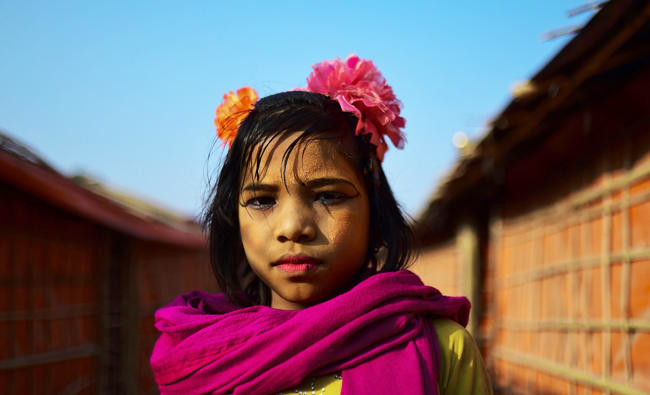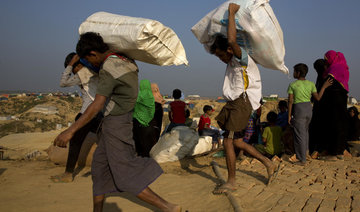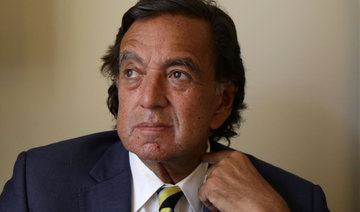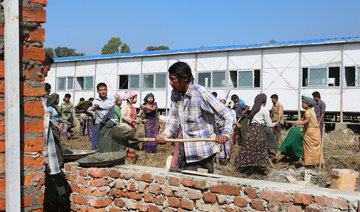COX'S BAZAR: The disturbing drawings of homes engulfed in flames, and stickmen hanging from trees that are produced by Rohingya children in Bangladesh’s overcrowded refugee camps are slowly giving way to the flowers and sunny days that psychologists expect from healthy youngsters.
But the prospect of returning to Rakhine, where the Myanmar Army and Buddhist mobs orchestrated a campaign of ethnic cleansing, could reverse the healing and damage children forever, say experts.
“My friends were slaughtered by the military and Buddhists when we were trying to escape. There were dead bodies everywhere,” 12-year-old Sadiya told AFP in a trembling voice, wiping away tears with her headscarf.
“If we go back now, they will kill all of us. I don’t think we will ever go back. I don’t want to.”
Sadiya is one of the 690,000 Rohingya who have pressed into Bangladesh since last August. Two thirds are children.
Thousands arrived alone, many carrying with them a handful of pitiful possessions and graphic stories of seeing their families murdered and their villages burned in an orgy of communal violence.
The UN estimates 170,000 children are suffering from some form of mental trauma, having witnessed rape and torture.
For months they have lived in the camps that have spread from the riverine border, where desperate conditions have steadily improved.
After months of global pressure on civilian leader Aung San Suu Kyi, Myanmar reached an agreement on Nov. 23 with Bangladesh to take back refugees.
The returns were supposed to start this week, but were suddenly shelved, with both sides blaming the other for a lack of preparation.
Aid agencies and experts say that is actually a good thing.
“We know the children that are already traumatized and need expert care, will be even more traumatized if they are forced to go back,” UNICEF Deputy Executive Director Justin Forsyth told AFP in the Balukhali refugee camp.
“Nightmares, wetting their beds, self harming. These are things children begin to do in extreme situations. I mean children shaking with fear because they don’t know whether they’ll see the same type of violence happening again.”
The small army of psychologists working in the camps say repatriation could cause the Rohingya children long-term damage just as they are coming to terms with the relative stability of their new lives.
A handful of child-safe zones have sprung up across the camps, offering a respite from the drudgery of survival, where youngsters can play, draw, sing, act and read in safety.
Little is known about what preparations the Myanmar authorities are making, but pictures that emerged this week of processing centers wrapped in razor wire offered a stark contrast.
Sirajum Monira, a Bangladeshi government clinical psychologist at Kutupalong camp, said returning youngsters was not simply a case of shovelling them back across the border.
“The incidents can’t be forgotten easily. It is a major incident for their life which will be carried out throughout their life,” she said.
“After repatriation, going back to their own home, they will need psychological support.”
Even before the killing began last August, life was hard for the Rohingya, a minority despised by most Burmese as illegal immigrants — despite many having lived there for generations.
Myanmar imposes strict controls on education, freedom of movement and religion in Rakhine, though actual conditions are difficult to verify because the government not allow foreign media or aid groups into the region.
Ten-year-old Mohamamad Zubayer, whose father was killed by Buddhist mobs, would prefer to stay where he is.
“I don’t mind living here forever,” he told AFP, saying he particularly enjoyed going to school — something he had not been able to do in Myanmar.
Traumatized Rohingya children fear return to Myanmar
Traumatized Rohingya children fear return to Myanmar

Uganda’s president seeks a seventh term that would bring him closer to 5 decades in power
Museveni, 80, has defied calls for his retirement, as critics warn that he as veered into authoritarianism with virtually no opposition even within his ruling National Resistance Movement party.
He was welcomed by a large crowd of supporters as he went to collect nomination papers from the offices of the ruling party in Kampala, the Ugandan capital.
Museveni first took power as head of a rebel force in 1986. He has since been elected six times, though recent elections have been marred by violence and allegations of vote rigging. His main opponent in the last election was the popular entertainer known as Bobi Wine, who has also declared his candidacy in the polls set for January 2026.
Wine, whose real name is Kyagulanyi Ssentamu, has seen many associates jailed or go into hiding as security forces cracked down on opposition supporters.
Museveni has dismissed Wine as “an agent of foreign interests” who cannot be trusted with power. Wine has been arrested many times on various charges but has never been convicted. He insists he is running a nonviolent campaign.
Decades ago, Museveni himself had criticized African leaders who overstayed their welcome in office. In Uganda, lawmakers did the same thing for him when they jettisoned the last constitutional obstacle — age limits — for a possible life presidency. His son, army chief Muhoozi Kainerugaba, has asserted his wish to succeed his father, raising fears of hereditary rule.
A long-time opposition leader, Kizza Besigye, has been jailed since November over alleged treason charges his lawyers say are politically motivated. Besigye, a physician who retired from Uganda’s military at the rank of colonel, is a former president of the Forum for Democratic Change party, for many years Uganda’s most prominent opposition group.
The East African country has never seen a peaceful transfer of power since independence from Britain in 1962.
Belgrade braces for another anti-government protest, calling for an early parliamentary election

- Tensions have soared ahead of the protest organized by Serbia’s university students, a key force behind nationwide anti-corruption demonstrations that started after a renovated rail station canopy collapsed
BELGRADE: Belgrade is bracing for yet another student-led protest on Saturday to pressure Serbia’s populist President Aleksandar Vucic to call for a snap parliamentary election after nearly eight months of rallies that have rattled his firm grip on power in the Balkan country.
Tensions have soared ahead of the protest organized by Serbia’s university students, a key force behind nationwide anti-corruption demonstrations that started after a renovated rail station canopy collapsed, killing 16 people on Nov. 1.
Many blamed the concrete roof crash on rampant government corruption and negligence in state infrastructure projects, leading to recurring mass protests.
Vucic and his right-wing Serbian Progressive Party have refused the demand for an early vote and accused protesters of planning to spur violence at orders from abroad, which they didn’t specify.
In a show of business as usual, the Serbian president handed out presidential awards in the capital to people, including artists and journalists, he deemed worthy, as his loyalists, camping in a park in central Belgrade, announced they would hold a “literary evening.”
“People need not worry — the state will be defended and thugs brought to justice,” Vucic told reporters on Saturday.
Serbian presidential and parliamentary elections are due in 2027.
Saturday marks St. Vitus Day, a religious holiday and the date when Serbs mark a 14th-century battle against Ottoman Turks in Kosovo that was the start of hundreds of years of Turkish rule, holding symbolic importance.
Police earlier this week arrested several people accused of allegedly plotting to overthrow the government and banned entry into the country to several people from Croatia and a theater director from Montenegro without explanation. Serbia’s railway company halted train service over an alleged bomb threat in what critics said was an apparent bid to prevent people from traveling to Belgrade for the rally.
Authorities made similar moves back in March, ahead of what was the biggest ever anti-government protest in the Balkan country, which drew hundreds of thousands of people.
Vucic’s loyalists then set up a camp in a park outside his office, which still stands. The otherwise peaceful gathering on March 15 came to an abrupt end when part of the crowd suddenly scattered in panic, triggering allegations that authorities used a sonic weapon against peaceful protesters, which they have denied.
Vucic, a former extreme nationalist, has become increasingly authoritarian since coming to power over a decade ago. Though he formally says he wants Serbia to join the European Union, critics say Vucic has stifled democratic freedoms as he strengthened ties with Russia and China.
What’s next for birthright citizenship after the Supreme Court’s ruling

- US President Trump’s executive order, signed in January, seeks to deny citizenship to children who are born to people who are living in the US illegally or temporarily
WASHINGTON: The legal battle over President Donald Trump’s move to end birthright citizenship is far from over despite the Republican administration’s major victory Friday limiting nationwide injunctions.
Immigrant advocates are vowing to fight to ensure birthright citizenship remains the law as the Republican president tries to do away with more than a century of precedent.
The high court’s ruling sends cases challenging the president’s birthright citizenship executive order back to the lower courts. But the ultimate fate of the president’s policy remains uncertain.
Here’s what to know about birthright citizenship, the Supreme Court’s ruling and what happens next.
What does birthright citizenship mean?
Birthright citizenship makes anyone born in the United States an American citizen, including children born to mothers in the country illegally.
The practice goes back to soon after the Civil War, when Congress ratified the Constitution’s 14th Amendment, in part to ensure that Black people, including former slaves, had citizenship.
“All persons born or naturalized in the United States and subject to the jurisdiction thereof, are citizens of the United States,” the amendment states.
Thirty years later, Wong Kim Ark, a man born in the US to Chinese parents, was refused re-entry into the US after traveling overseas. His suit led to the Supreme Court explicitly ruling that the amendment gives citizenship to anyone born in the US, no matter their parents’ legal status.
It has been seen since then as an intrinsic part of US law, with only a handful of exceptions, such as for children born in the US to foreign diplomats.
Trump has long said he wants to do away with birthright citizenship
Trump’s executive order, signed in January, seeks to deny citizenship to children who are born to people who are living in the US illegally or temporarily. It’s part of the hard-line immigration agenda of the president, who has called birthright citizenship a “magnet for illegal immigration.”
Trump and his supporters focus on one phrase in the amendment — “subject to the jurisdiction thereof” – saying it means the US can deny citizenship to babies born to women in the country illegally.
A series of federal judges have said that’s not true, and issued nationwide injunctions stopping his order from taking effect.
“I’ve been on the bench for over four decades. I can’t remember another case where the question presented was as clear as this one is. This is a blatantly unconstitutional order,” US District Judge John Coughenour said at a hearing earlier this year in his Seattle courtroom.
In Greenbelt, Maryland, a Washington suburb, US District Judge Deborah Boardman wrote that “the Supreme Court has resoundingly rejected and no court in the country has ever endorsed” Trump’s interpretation of birthright citizenship.
Is Trump’s order constitutional? The justices didn’t say
The high court’s ruling was a major victory for the Trump administration in that it limited an individual judge’s authority in granting nationwide injunctions. The administration hailed the ruling as a monumental check on the powers of individual district court judges, whom Trump supporters have argued want to usurp the president’s authority with rulings blocking his priorities around immigration and other matters.
But the Supreme Court did not address the merits of Trump’s bid to enforce his birthright citizenship executive order.
“The Trump administration made a strategic decision, which I think quite clearly paid off, that they were going to challenge not the judges’ decisions on the merits, but on the scope of relief,” said Jessica Levinson, a Loyola Law School professor.
Attorney General Pam Bondi told reporters at the White House that the administration is “very confident” that the high court will ultimately side with the administration on the merits of the case.
Questions and uncertainty swirl around next steps
The justices kicked the cases challenging the birthright citizenship policy back down to the lower courts, where judges will have to decide how to tailor their orders to comply with the new ruling. The executive order remains blocked for at least 30 days, giving lower courts and the parties time to sort out the next steps.
The Supreme Court’s ruling leaves open the possibility that groups challenging the policy could still get nationwide relief through class-action lawsuits and seek certification as a nationwide class. Within hours after the ruling, two class-action suits had been filed in Maryland and New Hampshire seeking to block Trump’s order.
But obtaining nationwide relief through a class action is difficult as courts have put up hurdles to doing so over the years, said Suzette Malveaux, a Washington and Lee University law school professor.
“It’s not the case that a class action is a sort of easy, breezy way of getting around this problem of not having nationwide relief,” said Malveaux, who had urged the high court not to eliminate the nationwide injunctions.
Justice Sonia Sotomayor, who penned the court’s dissenting opinion, urged the lower courts to “act swiftly on such requests for relief and to adjudicate the cases as quickly as they can so as to enable this Court’s prompt review” in cases “challenging policies as blatantly unlawful and harmful as the Citizenship Order.”
Opponents of Trump’s order warned there would be a patchwork of polices across the states, leading to chaos and confusion without nationwide relief.
“Birthright citizenship has been settled constitutional law for more than a century,” said Krish O’Mara Vignarajah, president and CEO of Global Refuge, a nonprofit that supports refugees and migrants. “By denying lower courts the ability to enforce that right uniformly, the Court has invited chaos, inequality, and fear.”
Russian strike on Ukraine’s Odesa kills two, wounds 14

- Moscow has stepped up drone and missile attacks on Ukraine
- Ukraine has launched retaliatory strikes on Russia throughout the war
KYiV: A Russian drone strike on Ukraine’s southern port city of Odesa killed two people and wounded 14, including children, local authorities said on Saturday.
Moscow has stepped up drone and missile attacks on Ukraine and peace talks initiated by the United States to end the three-year conflict have stalled.
“Rescuers pulled the bodies of two people from the rubble who died as a result of a hostile drone strike on a residential building,” Odesa Governor Oleg Kiper said on Telegram.
The night-time strike wounded 14 people, Kiper said, adding that “three of them children.”
Separately, authorities in Ukraine’s southern Kherson region said one person was killed and three others were wounded in Russian strikes over the past day.
“Russian troops targeted critical and social infrastructure and residential areas in the region,” the Kherson’s governor, Oleksandr Prokudin, said on Telegram early on Saturday.
Tens of thousands of people have been killed in Russia’s offensive, which has forced millions from their homes and devastated much of eastern Ukraine.
Ukraine has launched retaliatory strikes on Russia throughout the war.
The Russian defense ministry said on Saturday its air defense had shot down 31 Ukrainian drones overnight.
Moscow also said it had captured another village in the Donetsk region, which the Kremlin has claimed as part of Russia since late 2022.
Russia has demanded Ukraine cede more land and give up Western military support as a precondition to peace – terms Kyiv says are unacceptable.
Europe bakes in summer’s first heatwave as continent warms

- Scientists have long warned that humanity’s burning of fossil fuels is heating up the world with disastrous consequences for the environment
MARSEILLES: Sweating Europeans braced on Saturday for the first heatwave of the northern hemisphere summer, as climate change pushes the world’s fastest-warming continent’s thermometers increasingly into the red.
Temperatures are set to rise to 37 degrees Celsius (99 degrees Fahrenheit) in Rome, driving the Eternal City’s many tourists and Catholic pilgrims to the Vatican alike toward the Italian capital’s some 2,500 public fountains for refreshment.
With residents of the southern port city of Marseille expected to have to cope with temperatures flirting with 40C (104F), authorities in France’s second-largest city ordered public swimming pools to be made free of charge to help residents beat the Mediterranean heat.
Two-thirds of Portugal will be on high alert on Sunday for extreme heat and forest fires with 42C (108F) expected in the capital Lisbon, while visitors to — and protesters against — Amazon tycoon Jeff Bezos’s Friday wedding in Venice likewise sweltered under the summer sun.
“I try not to think about it, but I drink a lot of water and never stay still, because that’s when you get sunstroke,” Sriane Mina, an Italian student, told AFPTV on Friday in Venice.
Meanwhile Spain, which has in past years seen a series of deadly summer blazes ravaging the Iberian peninsula, is expecting peak temperatures in excess of 40C (104F) across most of the country from Sunday.
Scientists have long warned that humanity’s burning of fossil fuels is heating up the world with disastrous consequences for the environment, with Europe’s ever-hotter and increasingly common blistering summer heatwaves a direct result of that warming.
With peaks of 39C (102F) expected in Naples and Palermo, Sicily has ordered a ban on outdoor work in the hottest hours of the day, as has the Liguria region in northern Italy.
The country’s trade unions are campaigning to extend the measure to other parts of the country.
The heatwave comes hot on the heels of a series of tumbling records for extreme heat, including Europe’s hottest March ever, according to the EU’s Copernicus climate monitor.
As a result of the planet’s warming, extreme weather events including hurricanes, droughts, floods and heatwaves like this weekend’s have become more frequent and intense, scientists warn.
By some estimates 2024, the hottest year in recorded history so far, saw worldwide disasters which cost more than $300 billion.




















